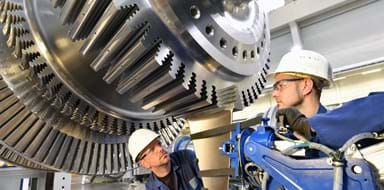
A software start-up has developed a novel AI-driven vision inspection tool with the potential to transform productivity, net zero and resilience in manufacturing.
Machine Intelligence (MI), based in Somerset, partnered with aerospace and defence giant BAE Systems’ Air division, based in the North West of England, as part of the Made Smarter Innovation Technology Accelerator programme, which aimed to develop technology prototypes to tackle key manufacturing challenges.
Innovation Case Study - BAE SystemsThe project developed and tested a solution that used bio-inspired machine learning algorithms to analyse X-ray images to accurately detect defects in the joints of metal parts, assisting human testing and quality checks.
So impressed with the results, BAE has applied the solution to an existing inspection process and is trialling it on another. MI is now working with BAE’s FalconWorks® division within Air and exploring broader industry applications.
Susan Bowen, CEO of Digital Catapult, which leads the Technology Accelerator programme, said: “This superb project demonstrates precisely the value of bringing together technology innovators with leading manufacturers like BAE with its long standing and proven record working cross-sector on collaborative development opportunities.”
Dr Ben Farmer, Deputy Challenge Director for Made Smarter Innovation at Innovate UK, said: “The Made Smarter Innovation funded Technology Accelerator enabled the development of technologies to help UK manufacturers innovate and overcome their key challenges.
“This project clearly demonstrates what collaboration can achieve to solve some of industry’s major challenges around productivity, net zero, resilience and skills development.”
The Inspiration
Manufacturing integrity inspections are critical but can be time-consuming, subjective, and prone to human error, especially in low-volume, high-value industries like aerospace.
At BAE Systems, the majority of manufacturing products are checked manually for defects to maintain quality and safety, as well as targeting ‘right first time’ in order to reduce waste and scrappage. This has clear financial and environmental benefits when achieved.
As part of its drive for digital transformation, personnel upskilling, and as a major influencer for the closing of the well-known digital skills gap in UK manufacturing, the company is exploring the introduction of a trustable artificial intelligence (AI) vision inspection system to assist its use of human testing and quality checks.
It wanted a quick, explainable solution for “go” or “no go” decisions, that was easy to deploy, requiring minimal data, could adapt to other assemblies, and would enhance operator capability and confidence.
James Leadbetter, Senior Engineer, BAE Systems, said: “Developing aerospace technology is challenging due to low volume, high flexibility and variation of products, and the growing demands from customers for customisation.
“Standard machine learning models require a lot of training data - thousands of images. In our world we may have as few as 30 images to train AI to help the inspector identify a problem with a part.
“Our aim is not to remove these highly skilled roles but develop new digital tools to increase their confidence, skills and job satisfaction. Made Smarter Innovation’s Technology Accelerator provided a golden opportunity to do just that.”
The Innovation
MI, an expert in systems integration, software development and AI, worked with BAE to develop a novel solution that uses bio-inspired machine learning algorithms to analyse X-rays to accurately detect defects.
It achieved this by training its software using X-rays with identified faults in welds of metal joints.
MI then developed a user-friendly prototype guiding users through labelling data, configuring the AI, teaching it, and viewing results.
Dr Simon Harding, founder of MI, said: “Visual inspection is a common manufacturing process which uses cameras and machine learning. But existing technologies are typically neural network-based systems, which are complex black boxes requiring thousands of training images.
“Our technology evolves computer programs to solve problems. These algorithms can debug, inspect and understand software, bridging the gap between human software engineering and machine learning.
“This innovation enables repeatable, accurate, high quality and simple defect detection from images. It is an intuitive platform that generates robust machine-learning models that can be inspected and improved by a human expert.”
The Impact
Having demonstrated the potential gains in productivity, net zero and resilience, BAE Systems has applied the solution to one existing inspection process, with positive results, and is trialling it on another.
Leadbetter explained: “This solution is already enabling all the benefits we had hoped for and I am confident that its application to more parts of the business are likely to follow in the coming years in line with our future manufacturing strategy.
“To compete on the world stage, we need to be efficient and up there with the best in regards to what we do with the people and technology. Projects like these are the way we do it, and we’ve already started developing several more.”
MI has now evolved from a consultative business model to developing its first standalone product.
BAE’s ‘stamp of approval’ has led to further engagement on FalconWorks®, its new research and development division focused on developing new air combat capabilities, and opened doors to other potential applications and customers across UK manufacturing.
Dr Harding added: “By leveraging our AI solution manufacturers can improve the consistency of inspections, which manifest efficiency and accuracy implications. The instant and more reliable analysis brings added reassurance, greater speed and frees up trained inspectors to spend their time on more complicated tasks. Identifying issues earlier will reduce production waste and energy usage, resulting in money savings.”
“This collaboration has been a fantastic experience for us. The AI startup marketplace is very crowded. We’ve proved that we have something that no one else is doing. As a result, we have forged what we hope is a longer-term relationship with a major company. That credibility means we are now talking to many different people about testing and deploying this technology in many other areas, including MRI and ultrasound. The potential of this technology to solve important problems in various areas is massive.”





